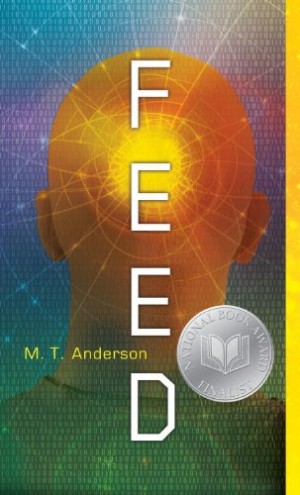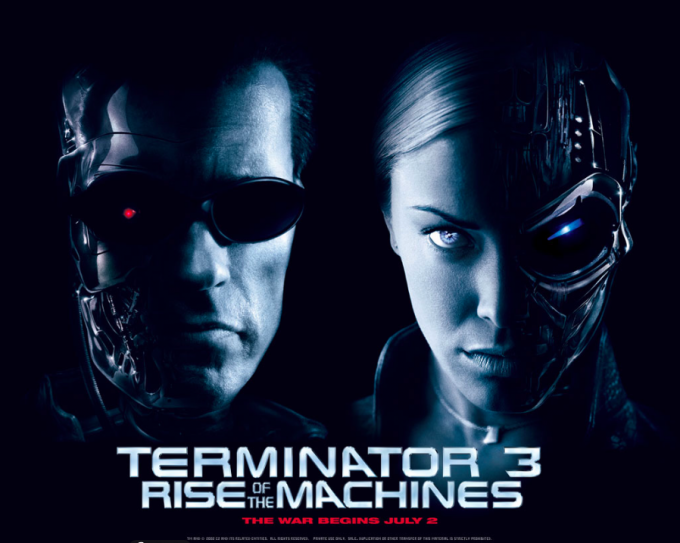
In 2002, M.T. Anderson wrote the novel Feed, which featured a future in which humans are all hardwired with computer chips (the eponymous Feeds) so they can shop. Constantly. Back then it was a comment on consumerism. Now, 13 years later, I was curious if he was sick of telling us all "I told you so."
I remember reading Feed in 2008-- already much of it seemed eerily close to the truth we were living. When apps like Shazam were announced, even before the Google Glass, it seemed we were all being led, neatly, to the point of sale-- and that I'd been warned about what that would be like. It's a truer story now than ever, and so I find myself thinking about this novel often.
Luckily, Mr. Anderson is a patient man, who was willing to talk with me about a book he wrote more than a decade ago. He never did say "I told you so," which I think speaks to his patience almost as much as this interview does. His answers were nearly as insightful as I found reading the novel in the first place. If you haven't read Feed, I hope you do. But at least, read this interview. Click these links. M.T. Anderson has truths to share.
MTH: When you sat down to write FEED, how much of the technology described within actually seemed feasible to you?MTA: When I wrote the book – this is back in 2001, a science-fiction future year now firmly in our past – I have to admit I just thought of the technology (the flying cars, the moon colonies) as a kind of camp sci-fi joke, and the “feed” itself as primarily something symbolic. I wasn’t thinking about the reality of consumer technology. Even without a chip in my head, I already had the voice of advertising whispering in my brain that my life should be different, should be better, and that I’d be loved if I only would do what was demanded of me. So it was the effect of consumerism that was most important to me – not the real tech.
Sure, I actually thought we would eventually come to the point when a hardware/wetware interface would be a reality, but if you’d asked me, I would have said that it was a long way off – 2040 or something. Then, suddenly, just a few years had passed, and Intel was saying they wanted to have chips in American consumers’ heads by 2020.
When I was a kid in the 80s (and for most of the 20th Century), we believed that the most revolutionary technologies would be in transportation. Check out any vision of the future – from the whimsical prophecies of 1900 to the Gernsback pulps of the mid-century with their flying fin-cars to the white, spotless space stations envisioned in Tomorrowland, we conceived of the future in terms of travel. How odd, for example, when you’re reading a story written in the Golden Age of Sci-Fi and all the people on a rocket are lugging around printed, bound books. Because the real revolution has been in information technology.
MTH: What headlines have you seen that made you think, wow, it really IS all coming true?
MTA: There have been all sorts of inroads into technologies which can read thought and interact with our various cortices … For example, trying to reconstruct visual images, or “recording” simple memories experienced by one rat and transferring them to another, or various kinds of “neuromarketing” which record the neurological minutiae of our buying habits.
All of these technologies have very exciting applications; and, of course, all of them offer new and unthinkable options for torture and control. My generation came of age during a turning point in human history comparable to the Gutenberg print revolution. The next generation will experience an evolutionary change unlike anything our species has undergone in recorded history.
Is that for the better? I don’t know. I’m used to being a human. I’m used to the sense (however illusory, however electrochemical) of an inward self which cannot be viewed by others – a place of retreat deep within. I’m worried by its disappearance. But for some, that may be less important, and all of this might simply be thrilling. After all, it’s not as if our often weird, radish-shaped species has a great track record in our current form.
MTH: My favorite sequence in the novel is when Titus describes playing sardines with friends, and perfectly encapsulates how using social media feels-- more watched, but also more alone than ever. That emotional sentiment seems to be cropping up a lot, now. Do you still think about that as you interact on the internet, with friends and fans?
MTA: I think it is very much an emotional reality for Millennials. But social media has a very different effect for different age cohorts. I would hate to be a teen right now. I feel for them. I was self-conscious enough as it was, what with looking kind of like a hairy lollipop. (I was excruciatingly thin.) The idea that all of those dramas and desires would play themselves out in public is sheer hell.
MTH: You've mentioned in passing that a lot of this started out as a joke to you. How do you talk about your relationship with technology and consumerism, now?
MTA: I think one of the ways in which my emphasis has shifted since I wrote Feed is that I worry more nowadays about those people on the distant ends of our chains of production than I do about us. That was an element in my thinking at the time, but now, I’m constantly aware that our cheap luxuries – my iPhone, my shirts – are predicated on a complicated and invisible chain of exploitations stretching around the world to, say, textile factories in Bangladesh and children laboring in tantalum mines in the Congo. As William Gibson said, “The future is here – it’s just not evenly distributed yet.” People ask me whether I think we’ll ever live in a “dystopian world.”
We already do. It’s just that we happen to live in the shining Capital, so we export the suffering elsewhere.
MTH: FEED is concluded with an amazing afterward, in which you encourage teens to do and think of things you can't even imagine. With all the development in teen persona being created online since it was written, 13 years ago, does that advice remain the same? What update to it would you offer, now?
MTA: Absolutely, that would still be my advice – except for the fact that I know teens are already thinking in ways totally alien to me without any prompting!
Given the gloomy turn this conversation has taken, let me say that it’s also important to think deeply about the impact we’re having as consumers, just as it’s important to think deeply about the impact we’re having as voters. For that reason, it’s worth checking out sites like the International Labor Organization and Free the Slaves. Though they may seem overwhelming at first, knowing that we actually can do things – that we can actually take direct action and conquer these problems – is actually really energizing.
Don’t forget that the online information sphere is just as much designed to conceal information as it is to reveal it. It’s designed to cocoon us. Don’t let yourself get duped. Fight to understand how your world really works. Hold on to your joy, as well as your anger.
And as for confronting all the rest – global climate change, resource contestation, the Singularity, the rise of AI, good God … Just remember:

The one on the left has already been Governor of California. And supposedly he spawned in secret.
You can learn more about M.T. Anderson and his ubiquitously intelligent, and eclectic body of work, here.



Continue the discussion at bbs.boingboing.net
2 replies